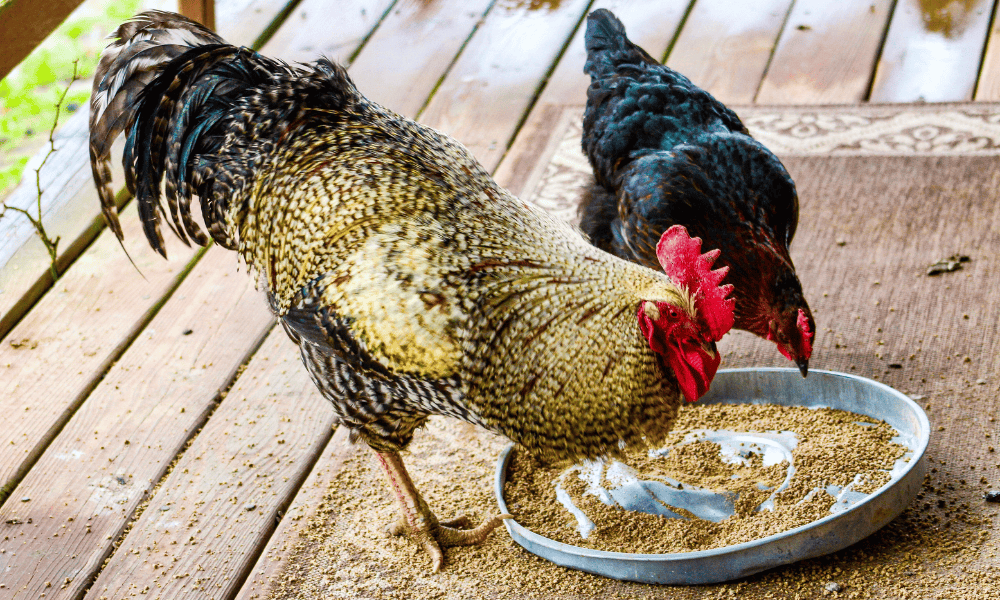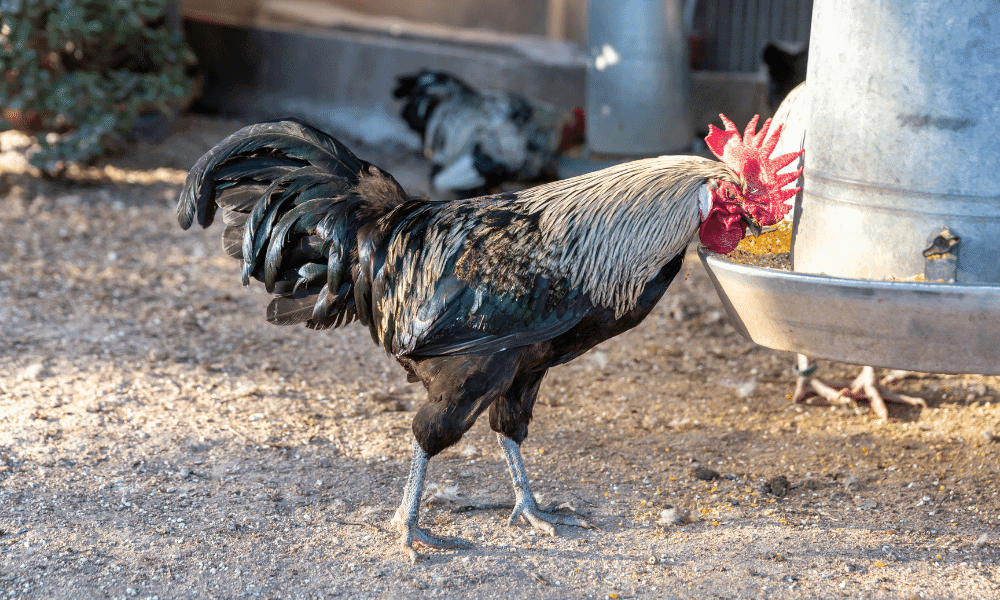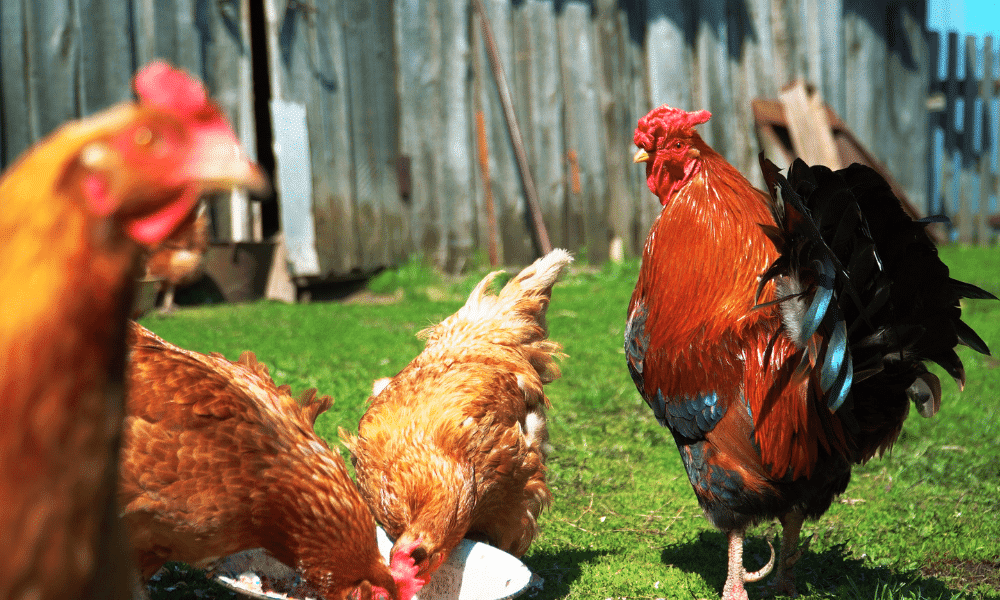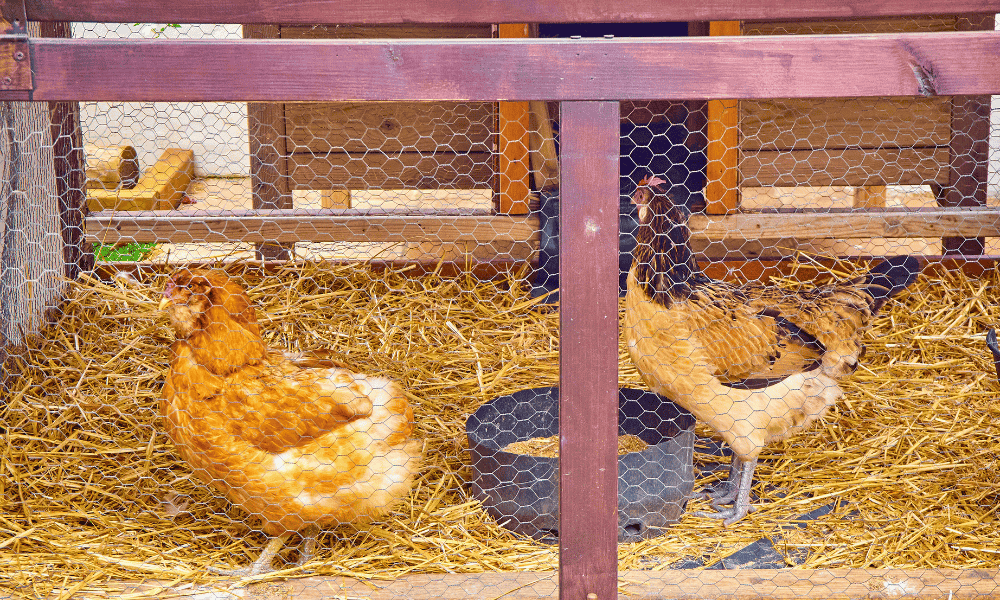When baby chicks are young, feeding them couldn’t be simpler: both female and male baby chicks have the same nutritional needs.
But, when your chicks begin to mature into hens and roosters, their dietary needs diversify, particularly because roosters grow much bigger and stronger, and hens start laying eggs.
This begs the question, can hens and roosters actually eat the same feed, even if it’s layer pellets or a layer seed mix?
Coming from someone who’s raised several generations of hens with and without roosters, let me tell you:
- Whether roosters can eat layer feed
- What you should feed your roosters
- If you can feed your roosters and hens together
- What you need to be conscious of when feeding your rooster
Contents
Can Roosters Eat Layer Feed?

Layer feed, either layer pellets or a layer pellet-seed mix, is specifically formulated to contain all the essential nutrients a laying hen needs.
Packed full of optimal protein (16-18%), calcium, and other nutritional content, in essence, layer feed is made to keep your hens healthy and to maximize egg-laying volumes and quality.
Of course, here’s the blaring issue when it comes to feeding your roosters layer feed: Roosters don’t lay eggs! Plus they’re bigger and have very different habits and duties!
So is it OK for roosters to eat layer feed?
In short:
- Roosters require MORE protein than hens: Roosters require 18-20% protein, hens require 16-18% protein
- Hens require MORE calcium than roosters: For healthy egg-shell formation.
So, it’s completely safe and OK to feed layer feed to your roosters, but you should ensure the crude protein content of your layer feed is at least 18%, and/or you should supplement protein into your rooster’s diet.
Alternatively, you can choose to feed your entire flock normal chicken feed, but simply supplement extra calcium into your hen’s diets (either by feeding them oyster shells, crushed egg shells, or other calcium supplements like shrimp/prawn shells), and extra protein accordingly.
Note: the excess calcium content in layer feed will not harm roosters either.
Do Chicken Owners Normally Feed Roosters Layer Feed? – A Community Case Study.
We asked members of our BFL’s Daily Dozen Chicken Newsletter if they feed their roosters the same feed as their hens and this was the response:
Feed roosters and hens the same layer feed: 35%
Feed roosters and hens the same chicken feed, but supplement calcium into hen’s diets/extra protein into roosters’ diets: 65%
This pretty much matches our consensus too:
- It’s absolutely OK for you to feed roosters layer feed so long as you are supplementing extra protein in their diet
- AND it’s absolutely OK to feed your hen’s normal chicken feed, so long as you are supplementing extra calcium in their diet, and protein depending on the feed.
What To Feed Your Roosters

If you are raising several roosters on their own (good luck to you!) then you may be wondering what you should feed them.
Of course, since roosters don’t lay eggs they won’t need layer feed, as they simply won’t need that much calcium or other minerals and nutrients that help in egg-laying.
So, although roosters CAN eat layer feed, whether it’s layer pellets or a layer seed mix, you can choose to feed your rooster’s flock raiser instead. Flock raiser is a great option for roosters, both for the purpose of raising meat birds, but also simply for normal backyard roosters!
Flock raiser offers your roosters a formulated mix of everything they need, with adequate amounts of calcium, without going overboard, and protein at 18%.
Of course, if you simply feed your rooster layer feed, you can supplement their normal diet with high-protein snacks to ensure they are getting enough of everything they need.
High-protein foods your roosters can eat include things like flax seeds, chia seeds, poppy seeds, and you can offer them preservative-free meats or even scrambled eggs!
Can You Feed Roosters And Hens Together?

Just to be clear, it’s completely OK to simply feed roosters and hens all together, using the same food and the same feeder. Just be sure the food you are giving your hens and roosters contains enough calcium for the laying hens, and enough protein for your roosters, with a minimum of 18%.
Because of the pecking order, your rooster will always be one of the first to feed, but so long as there is enough food for all your chickens then there is no risk of feeding them altogether.
If you still feel your roosters aren’t getting enough protein you can always try to supplement protein into their diets with high-protein chicken-safe foods, or high-protein bird feeds like game bird feed.
Can Cockerels Eat Layer Feed

Cockerels (young roosters), just like pullets (young hens) have not reached maturity yet.
Young chicks between the ages of 7-18 weeks old should have roughly 17% protein in their diets, which is honestly pretty similar to fully-grown laying hens, and fully-grown roosters.
Therefore, it is OK to feed your cockerels layer feed, so long as it’s between 16-18% in crude protein levels.
Still, if you’re looking for optimal nutrition it’s highly recommended to feed your cockerels or pullets grower feed, which has optimized protein and micronutrients to ensure they develop to their fullest potential!
Quick Summary
So, next time you’re at tractor supply or your local farming store and you see bags of layer pellets or layer feeds, remember, both roosters and hens can eat it safely.
But, no matter what kind of feed you’re providing your flock, you should always be conscious that roosters do need more protein than hens (18-20% in roosters VS. 16-18% in hens).
Of course, hens also need more calcium than roosters.
Therefore, to get the optimal dietary needs for your flock right, you can:
- Feed your entire flock layer feed, so long as you are also supplementing extra protein into your rooster’s diet, or
- Feed your entire flock normal chicken feed, so long as you are supplementing extra calcium in your hen’s diets, and extra protein in your roosters (& hens) diets where applicable, or
- Feed your hen’s layer feed (16-18% protein) and your roosters a high-protein flock raiser (18-20% protein).
